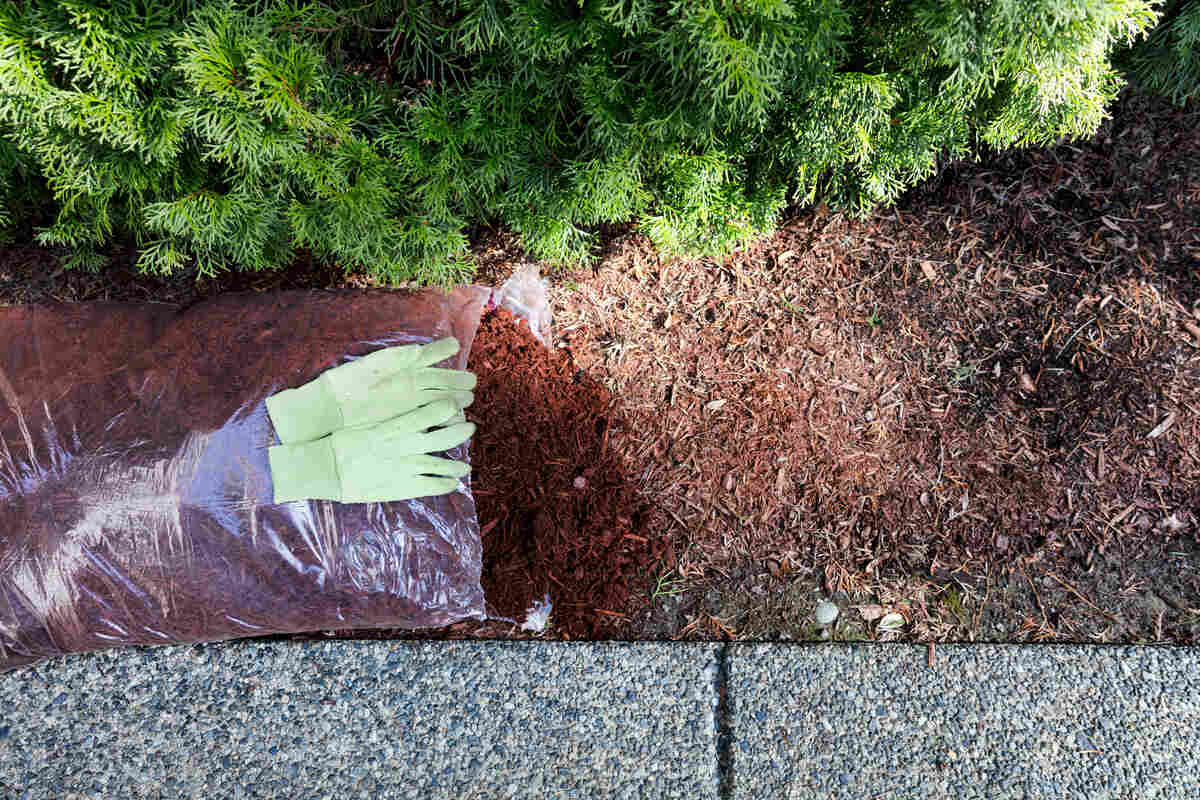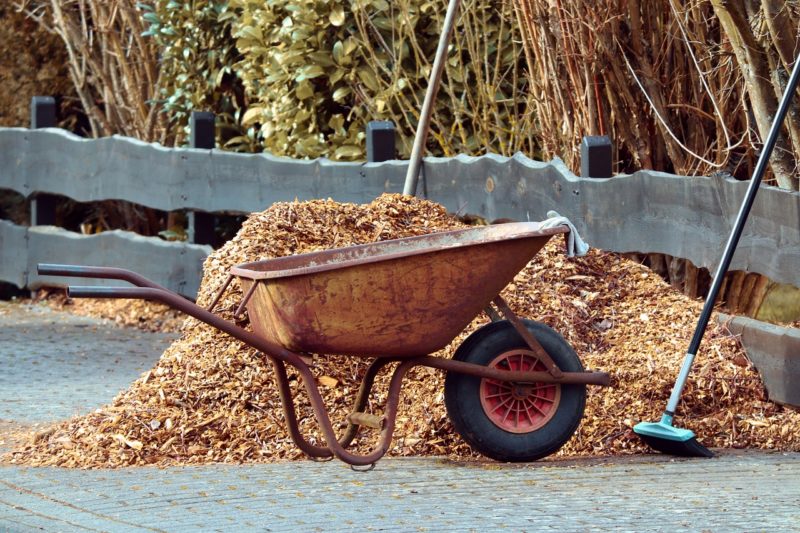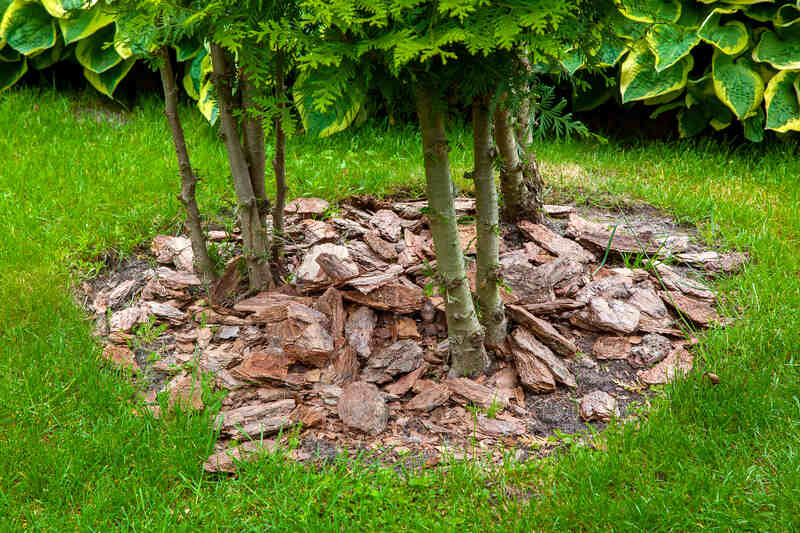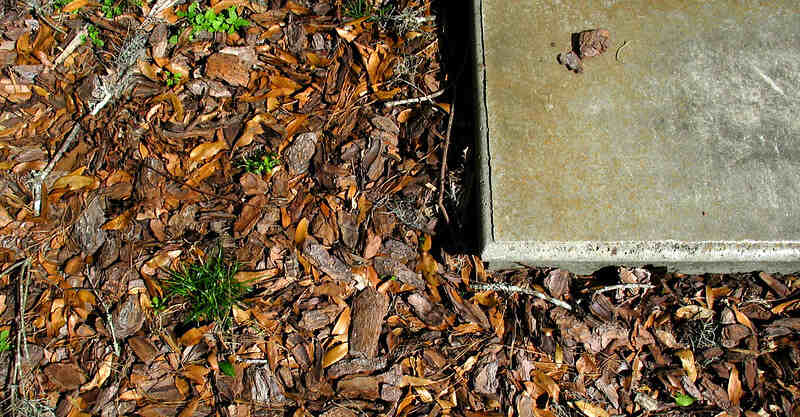
Mulch is spread on the soil surface to help prevent weeds and retain moisture. Another reason homeowners choose to mulch is to add color and beauty to their “sea of green” lawns.
This protective layer of material can make a huge difference in how plants grow. We’ll discuss in more detail the uses of mulch and its different types. We’ll also give you expert tips on how you can use mulch more effectively in your yard.
What is Mulch Used For?

Apart from stopping weed growth and keeping the soil moist, mulch also regulates soil temperature and helps improve soil health. Here are the top uses for mulch:
- Prevents Weed Growth: Since many weed seeds need sunlight to germinate and grow, adding mulch can block this process and help suppress weed growth.
- Retains Soil Moisture: You can add mulch if your soil moisture is not ideal. Mulch can act as a barrier that lessens water loss in soil through evaporation.
- Regulates Soil Temperature: In summer, mulch prevents heat from rapidly penetrating the soil. During winter, mulch prevents the soil from freezing quickly.
- Controls Erosion: Mulch acts as a protective layer that absorbs the impact of raindrops and reduces soil runoff. Its soil temperature regulation and moisture retention both improve soil stability and control erosion.
- Improves Soil Health: When organic mulch breaks down, it contributes to the soil structure and its water-holding capacity. It also creates a favorable environment for beneficial soil microorganisms to thrive.
- Adds Aesthetic Appeal: Although this doesn’t apply to mulches like newspaper or cardboard, most types of mulch can add beauty to your landscape and increase home value.
Pro Tip: Rubber, wood, and other mulches come in different colors. So, if you’re not good at coordinating colors, you might want to hire a landscaping pro to take care of your mulching needs. Plus, they can help you determine which mulch would most benefit your lawn and garden.
See Related:
What is Mulch Made Of?
Mulch can be made from either organic or inorganic materials, which is how experts classify them. The primary difference between the two can be found in their composition and decomposition.
Organic vs. Inorganic Mulch
Organic mulches are derived mostly from plants and animals, so they are biodegradable. And when they break down, they help enrich the soil.
Inorganic mulches are usually made of rocks and plastics, which don’t decompose. However, home improvement stores and garden centers now carry mulch films made from 100% biodegradable materials.
This table gives you a more detailed comparison of the two types of mulch:
| Attribute | Organic Mulch | Inorganic Mulch |
| Source | Living or dead plant/animal matter | Non-living materials |
| Examples | Leaves, bark, compost, wood chips, and straw | Rocks, gravel, rubber, and landscape fabric |
| Decomposition | Decomposes and releases nutrients to the soil over time | Most inorganic mulches don’t decompose |
| Weed Suppression | Controls weeds until it decomposes | Offers longer-lasting weed control |
| Environmental Impact | Biodegradable and beneficial to soil health | Non-biodegradable plastics can be harmful |
| Maintenance | Needs replacing regularly | Requires little to no replacement |
| Soil Improvement | Can improve soil structure and water retention | Does not improve soil properties |
| Aesthetics | Natural, earthy appearance that blends well with gardens | Offers a cleaner, more structured look with various color options |
While it can naturally break down and release nutrients, organic mulch isn’t necessarily the best solution for all situations. For instance, Michael Andruczyk, senior horticulture agent at Virginia Cooperative Extension, says that when organic mulches are “applied to fruit trees, this may encourage vegetative growth during the summer rather than fruiting.”
Once you know what mulch is made of, it can help you determine which type you need for your yard. Here are the different types of organic and inorganic mulches.
Types of Organic Mulch

Wood Mulch: Nathanael Asaro / Adobe Stock Free / License
Tree Bark: Jon / Adobe Stock
Pine Needles: Pixabay
Straw: Pxhere
Wood Chips: Shadowmeld Photography / Wikimedia Commons / CC BY-SA 4.0
Leaves: Pxhere
Newspaper: OakleyOriginals / Flickr / CC BY 2.0
Grass Clippings: Darren Lewis / PublicDomainPictures / CC0
Compost: Oregon State University / Flickr / CC BY-SA 2.0
12 Most Common Types of Organic Mulch
To give you a better idea of which mulches fall in the organic category, here are the most common types of organic mulch:
- Wood Chips: Available in various colors, such as brown, black, and red, wood chips are ideal for controlling weeds in gardens and pathways. Shredded wood is affordable and lasts up to 2 years.
- Wood Nuggets: Larger than wood chips, these nuggets are less likely to get blown away by the wind and can last up to 4 years. With their low pH of around 3.3 to 5.0, they’re perfect for flower beds of acid-loving plants like hydrangeas, gardenias, and azaleas.
- Wood Bark: Another type of wood mulch, shredded bark has more of a fibrous texture since it’s made solely from tree bark. While it can last up to 7 years, it’s better to replace it once it fades or every 2 years. Wood bark would look good in pathways and around trees and shrubs.
- Straw: This can be a good choice if you don’t mind adding mulch often, as it only lasts 3 to 6 months and decomposes after a year. Made from wheat, barley, or rye stalks, straw mulch helps retain moisture and prevent soil compaction. Usually yellowish-tan in color, it’s lightweight and perfect for protecting germinating grass seeds.
- Pine Needles: Sometimes called pine straw, this type of organic mulch can also help prevent weeds and moisture loss. Usually reddish-brown, pine needles can make your flower beds and landscaping beds more beautiful. Lasting up to 2 years, pine needles can interlock and form a stable layer, resisting wind and rain even on slopes.
- Compost: A decomposed organic waste rich in nutrients like carbon and nitrogen, compost can help enhance soil health and suppress weeds at the same time.
- Grass Clippings: You can get this nitrogen-rich mulch for free when you mow your lawn using a mulching mower. They break down quickly, though, so they only last up to 3 months. But according to Andruczyk, grass clippings are a great way to recycle nutrients and prevent organic matter from going to the dump.
- Shredded Leaves: If you have trees in your yard, you can easily obtain this mulch. They last 6 to 12 months and are best used around trees, shrubs, and flower beds. Shredded leaves can help improve soil health and retain moisture.
- Cardboard: For stopping weeds, sheet mulching with cardboard is the most effective. Until it decomposes after 4 to 6 months, the cardboard will create a solid barrier that weeds won’t be able to penetrate.
- Newspaper: Don’t throw your old newspapers into the recycling bin, as they’re also an excellent weed barrier (4 to 5 sheets thick). And they’ll add carbon to the soil once they decompose after 3 to 6 months. Since colored inks usually contain metals, use only the black and white pages.
- Coco Coir: Made from coconut husks, coco coir is a sustainable and better option than peat moss. It’s excellent at retaining water and improving soil aeration, making it ideal for flower beds, vegetable gardens, and potted plants. This fibrous mulch breaks down slowly and lasts up to 2 years.
- Cocoa Bean: Cocoa bean mulch is made from cocoa shells, providing nutrients like nitrogen and phosphate. However, it’s best not to use it in areas where pets can accidentally ingest it.
Pro Tip: When using newspaper or cardboard mulch, lay them carefully and overlap to avoid gaps. Otherwise, weeds can still grow through the gaps. Also, add 2 to 3 inches of either wood mulch or other organic mulch to make it pleasing to the eyes.
See Related: Is It Better to Rake or Mulch Leaves?
Types of Inorganic Mulch

Landscape Plastic: Jack Tamrong / Adobe Stock / License
Stone/Gravel: leighklotz / Flickr / CC BY 2.0
Rubber: Ian D. Keating / PxHere
Landscape Fabric: Pixabay
5 Most Common Types of Inorganic Mulch
If you don’t like having to replace your mulch often, your best bet would be the more long-lasting inorganic mulches. The most popular types of inorganic mulch are:
- Stone/Gravel: A long-lasting and low-maintenance mulch, stones are ideal for pathways, trees, and steep areas. They come in various types, like pea gravel, marble chips, and river rocks.
- Rubber: Made from recycled tires, rubber mulch can last up to 20 years and comes in various colors, including blue, green, and gray. It suppresses weeds and provides cushioning, but has a strong odor that can be repulsive to some homeowners.
- Shells: Bring the beach to your yard by adding shells to your pathways and landscaping beds. Made from crushed clam, oyster, or mussel shells, this inorganic mulch can last for over 5 years with minimal degradation.
- Landscape Plastic: A solid sheet made of plastic that blocks sunlight and weeds completely. However, it can also restrict water and air flow to the soil. For a more eco-friendly option, you can use a biodegradable mulch film as an alternative.
- Landscape Fabric: It’s similar to landscape plastic but allows water and air to pass through. Apart from lasting longer than plastic, landscape fabric is also more aesthetically pleasing.
See Related: Pros and Cons of Using Landscape Fabric
Where Can You Use Mulch in Your Yard?

While most homeowners apply mulch in flower gardens and landscaping beds, other areas in your yard can also benefit from it. Here’s a list of areas in your yard where you can apply mulch and the best types to use:
| Yard Area | Best Mulch Types to Use |
| Flower beds | Wood nuggets, pine needles, shredded leaves, coco coir, compost |
| Vegetable gardens | Pine needles, coco coir, straw, compost, grass clippings |
| Around trees | Wood bark, shredded leaves, wood chips, pine needles |
| Under hedges and bushes | Wood nuggets, pine needles, wood bark |
| Pathways/walkways | Gravel, rubber, wood chips, crusher dust, wood bark |
| Sloped areas | Pine needles, wood bark, landscaping fabric |
| Potted plants | Coco coir, compost |
| Play areas | Rubber |
| Rain gardens | River rocks |
See Related:
When Do You Apply Mulch?

Most experts say to apply mulch either mid- to late spring or in late fall. Andruczyk adds that the best time would be “after you clean up the weeds and before new weed seedlings start.”
Below are the details on both spring mulching and fall mulching:
Spring Mulching
Experts recommend that early spring is the perfect time to apply mulch to your lawn and garden. Mulch can help provide the best environment for the plants to grow during this season while preventing weeds from developing at the same time.
Fall Mulching
Mulching in fall is a practice that trees have been doing for thousands of years, dropping leaves and twigs before winter to form a layer of organic matter to protect themselves from the coming winter. Fall mulch protects plants from frost and lessens the damaging effect on soil structures as it undergoes moderate freeze-thaw cycles.
See Related:
FAQ About Mulch
Yes, you can mix different types of mulch, but it depends on the mulch you’re combining. For instance, adding wood chips on top of landscape fabric is not advisable. Once the wood chips decompose, the nutrients won’t be able to penetrate the fabric and reach the soil.
On the other hand, mixing newspaper mulch with other organic mulches works well. So it’s always best to consult with local lawn care experts when it comes to combining mulches.
In some cases, you won’t have to remove old mulch before putting down new mulch. For example, if you used wood bark and it’s already decomposing, you can just add your new mulch over it. But if your existing mulch shows signs of fungal disease or is excessively thick, it’s best to remove it first.
Inorganic mulches like stone and gravel last a long time since they don’t decompose.
Mulch Without Ado: Hire a Landscaping Pro
Now that you know what mulch is, you can use it to suit your lawn’s needs. But if you’re still confused whether to use organic or inorganic mulch, hiring a local landscaping pro to work on your landscape can help you avoid costly mistakes and give you peace of mind.
Sources:
- “Frost Heaving and Herbicides.” By Dwight Lingenfelter, extension associate. PennState Extension.
- “Knowing Better: The Appropriate Use of Landscape Fabric.” By Amanda Bratcher, extension agent. North Carolina State Extension.
- Michael Andruczyk, senior horticulture agent at the Virginia Cooperative Extension. Personal interview.
- “Mulch.” By Marjan Kluepfel, former horticulture information specialist, and Robert F. Polomski, PhD, associate extension specialist. Clemson University.
- “Mulch Plays Important Role in Gardening.” Oklahoma State University Extension.
Main Image Credit: tab62 / Adobe Stock Free / License